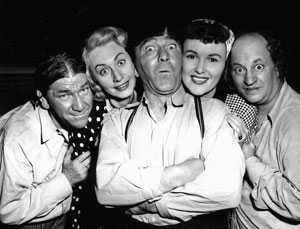Cuckoo on a Choo Choo
| Cuckoo on a Choo Choo | |
|---|---|
 | |
| Directed by | Jules White |
| Produced by | Jules White |
| Written by | Felix Adler |
| Starring |
Moe Howard Larry Fine Shemp Howard Patricia Wright Victoria Horne |
| Cinematography | Henry Freulich |
| Edited by | Edwin H. Bryant |
| Distributed by | Columbia Pictures |
Release dates |
|
Running time | 15' 28" |
| Country | United States |
| Language | English |
Cuckoo on a Choo Choo is the 143rd short subject starring American slapstick comedy team The Three Stooges. The trio made a total of 190 shorts for Columbia Pictures between 1934 and 1959.
Plot
Larry and Shemp are hiding out in a stolen railroad car called "Schmow." Larry wants to marry his girlfriend Lenore (Patricia Wright), but she refuses to consent until Shemp marries her sister Roberta (Victoria Horne). Lenore wants to honor her family's tradition of the oldest daughter marrying first, and Shemp is very wealthy. The problem is that Shemp is rarely sober, and madly in love with an imaginary giant canary named Carrie.
A private investigator from the railroad (Moe) finds the missing train, and is trying to get a sense of how the car was stolen from a moving train. As fate would have it, Moe had a previous relationship with Roberta, and has not seen her for years. He is ecstatic to find her after many years of disconnect, and tries his best to rekindle the long dormant love affair. Larry tries to pit Moe and Shemp against each other over Roberta, but Shemp still prefers Carrie.
Moe then decides to abandon his responsibilities and stay with the group, trying to marry Roberta. In the end, Shemp winds up with both women, but still prefers his imaginary bird.

Reception
Cuckoo on a Choo Choo has been dubbed one of the most original and unique shorts in the Stooge canon.[1] However, fans and critics alike generally regard it as the worst Stooge comedy made.[2]
Production notes
The plot device of Cuckoo on a Choo Choo is borrowed from two popular films of the period. The idea of a stolen railroad car is a parody of A Streetcar Named Desire, while the imaginary animal friend parodies the film Harvey (Victoria Horne had starred in the latter).[1] The theme of a woman's unwillingness to marry until her sister can be found in a willing husband-to-be alludes to Kiss Me, Kate, a Cole Porter musical based on the Bard's play, which also had a 1953 MGM film adaptation.
This reportedly was one of Larry Fine's favorite shorts to watch repeatedly during his last years in the Motion Picture House. It is one of the only Stooge shorts in which he plays a different character than usual: tougher, more domineering, and speaking in a gravelly, mumbly voice in a broad parody of Marlon Brando as Stanley Kowalski in A Streetcar Named Desire.[1]
Over the course of their 24 years at Columbia Pictures, the Stooges would occasionally be cast as separate characters. This course of action always worked against the team; author Jon Solomon concluded "when the writing divides them, they lose their comic dynamic."[1] In addition to this split occurring in Cuckoo on a Choo Choo, the trio also played separate characters in Rockin' in the Rockies, He Cooked His Goose (and its remake Triple Crossed), Gypped in the Penthouse, Flying Saucer Daffy and Sweet and Hot.[1]
References
- ↑ 1.0 1.1 1.2 1.3 1.4 Solomon, Jon (2002). The Complete Three Stooges: The Official Filmography and Three Stooges Companion. Glendale, California: Comedy III Productions, Inc. pp. 316, 376. ISBN 0-9711868-0-4.
- ↑ Lenburg, Jeff; Howard Maurer, Joan; Lenburg, Greg; (1982). The Three Stooges Scrapbook, p. 259, Citadel Press. ISBN 0-8065-0946-5